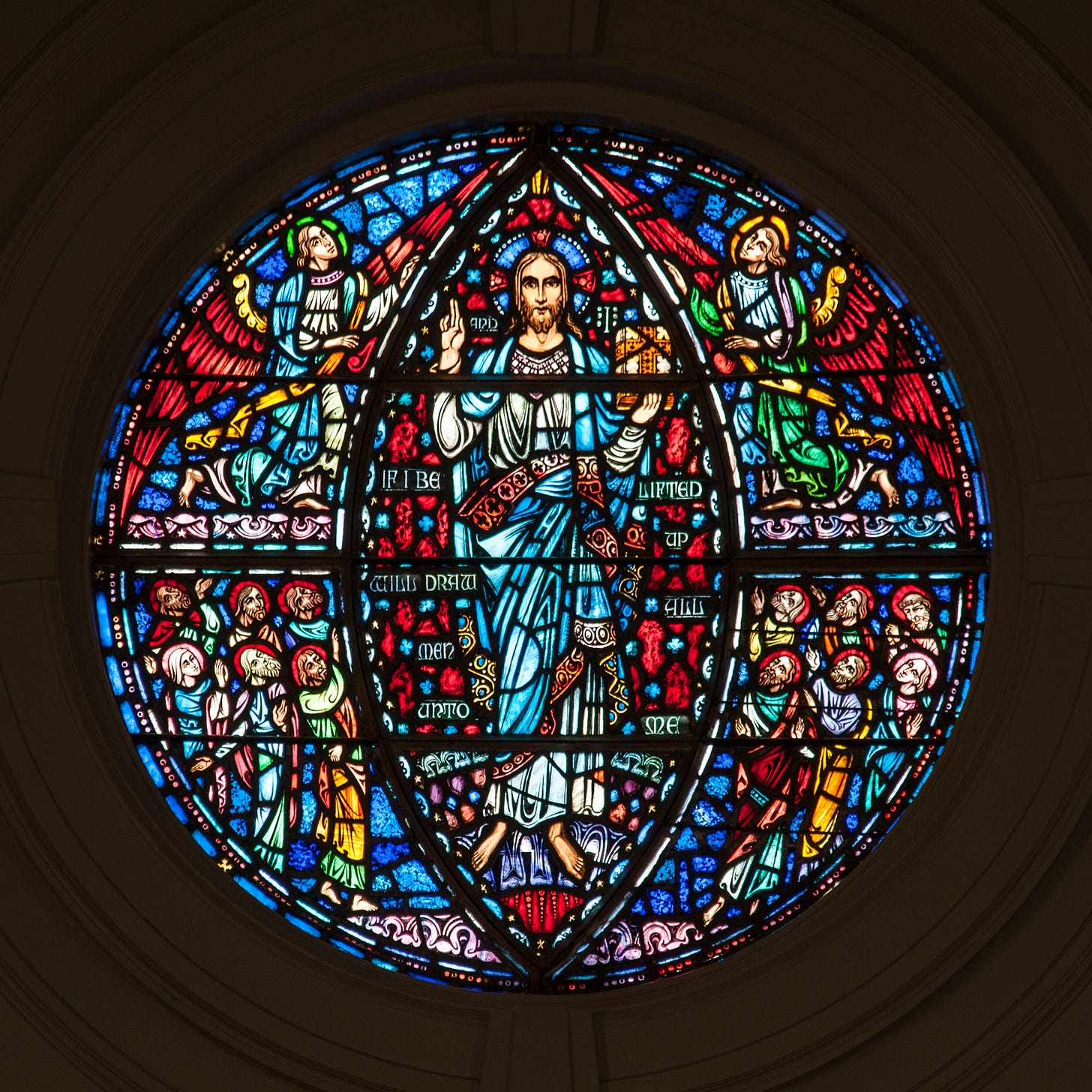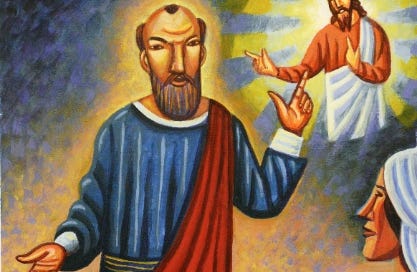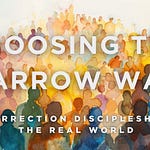In this letter to the church in Galatia, like Pastor Sara’s favorite WWF wrestler, Paul lays the theological smackdown on Peter. There was confusion and debate in the early church over who was “in” and who was “out,” and what was required to be “in.” Peter, the rock upon which Christ would build his church, the same guy who denied Jesus three times as Jesus made his way to Calvary, Peter caved under the pressure of false teachers to add fluff to the Gospel. Peter added shoulds and musts, to the message of the gospel. Peter added “This you must do for God” to the good news of “This is what God has done for you.” In what should be a warning to all of us who think we have got it and understand the gospel, Peter, the first recipient of— and preacher of— the gospel had reverted back to the law.

In adding to the Gospel, Peter was annulling the Good News of what God had gone ahead and done for us in Jesus Christ.
Each of us is attracted to false gospels; Paul even says that the law is written on our hearts— we WANT to be told what to do, if only so we can judge our neighbor’s shortcomings. All of us have fallen short of righteousness, scripture says, but that doesn’t stop us from measuring distances. Each of us, like Peter, adds lists of shoulds to what others must do to be justified, made righteous, before God. And more often than not, the shoulds and musts prescribed to others and ourselves directly contradict Jesus’ words. Or worse, the shoulds and musts we prescribe to others run contrary to the lives we live.
Shoulds and musts are dangerous to the Church. Over the past few months, in three docuseries, we have seen what happens when shoulds and musts are added to the gospel. Whether it was at Hillsong Church, an international megachurch that covered up years of sexual abuse by multiple pastors, across multiple continents, or the Duggars on TLC who used the shoulds and musts of purity culture to control the women and girls in their family, law was required to earn righteousness all the while those doing the prescribing were abusing people in the pews and home. Shoulds and must are dangerous because, inevitably they are the way we create God in our image.
Paul makes the point that shoulds and musts, the law prescribed to Gentile Christians by their Jewish Christian counterparts, was an attempt to rebuild barriers that Jesus had already broken down. Paul argues that what we do, the lovely church person things we do, do not make us any better in the eyes of God. And because these acts do not make us more right before God, those shoulds and musts serve only as distractions from the good of the Good News of Jesus Christ.
Verse 16, “We know that a person is not justified by the works of the law but through faith in Jesus Christ. And we have come to believe in Christ Jesus so that we might be justified by faith in Christ, and not by doing the works of the law, because no one will be justified by the works of the law.”
“We might be justified by faith in Christ,” or as Dr. Beverly Gaventa points out, “Faith here can be a reference to either belief or trust in Jesus Christ or to Jesus Christ’s own faithfulness.”[i]
Shoulds and musts run contrary to faith; our faith, and the faithfulness of our crucified messiah.
Shoulds and musts serve only to dilute the Grace of God.
On justification through faith and Christ’s faithfulness, Robert Capon writes that nothing needs to be added to the Gospel. “Grace has to be drunk straight,” Capon writes, “No water, no ice, and certainly no ginger ale.”[ii] Nothing added.

I have done my best to put up walls as my family and I prepare to leave Mount Olivet, but last week Jim Coates opened the floodgates. As Jim came forward to receive communion, I handed him the bread and said, “The body of Christ, a sign of how much God loves you, Jim,” he had the audacity to say, “Amen.” Then he added, “God bless you, Pastor Teer.”
The walls came down at that moment (and I almost had to blow my nose on Communion linen). And this week, I have been reflecting on how I got here. While technically a “second career pastor,” I went to college with the intention to enter the ministry. Being raised in a United Methodist church, pastors like Robert Manthey, Gaye Smith, and Kenn Dunnington taught me to take the Grace of God seriously. Pastors and mentors persuaded me to ensure that no one misses out on the Grace of God.
I attended a United Methodist college to study religion, yet graduated with a Criminal Justice, Sociology, and Political Science degree. The message I heard on campus from the evangelical student groups replaced the good-filled Good News with shoulds and musts, trading faith in Christ and Christ’s faithfulness with condemnation.
Instead of being the body of Christ, the church, I was told, was to call out sin on campus. I know, WTF (why the face)! Needless to say, this ran contrary to my United Methodist upbringing and what I believed to be true. I was not willing to trade Grace for condemnation, so I pivoted: Criminal Justice, Sociology, Political Science, and a fraternity.

The Gospel is scandalous because the good of the Good News bypasses our sensibilities and declares, whether we like it or not, not only does God love you and them, but you and they are forgiven. Christ crucified, dead, and raised has justified all of creation before God.
Rev. Fleming Rutledge wrote, “[Jesus] is willing to die even for such poor specimens as you and me, covering our unrighteousness with his righteousness, offering his life to save us from death, victorious over the old Adam, the Judge judged in our place. He has compensated for our too-short list of good deeds by his one great deed.”[iii]
Our justification, righteousness, and forgiveness before God are not Jesus plus something else.[iv]
Not Jesus, plus certain church practices.
Not Jesus, plus an overly specific theological position.
Not Jesus, plus a political party.
Not Jesus plus virtue-signaling.
Not Jesus, plus shoulds and musts.
Not Jesus, plus condemnation.
If we add anything, any should or must, any label, then Paul is absolutely correct, as Jesus would have died for nothing. So not only are the shoulds and musts dangerous as they can turn into abuse within Christ’s body, but they annul the good of the Good News.
But (and because it is a big but you know it does not lie) because of God’s grace and Christ's faithfulness, we are redeemed and no longer have reason to worry.
Through the waters of our baptism, we die to ourselves and are raised to new life in and through Jesus Christ. In our dying to self, we can then keep the Grace of God at the forefront of our lives.
Our faith in the faithfulness of Christ is enough because it is God’s Grace that transforms us, not our works, from the inside out.

I arrived at Mount Olivet in the summer of 2017. I met Pastor Ed Walker on my first Sunday morning in the sanctuary, and after a few minutes, he left me, giving me time to collect my thoughts. I was drawn to the stained-glass window above the cross in the quiet sanctuary. On that summer morning, the sun's light illuminated the glass, highlighting each piece and bringing the image of Christ’s Ascension on the Mount of Olives to life.
Without light, stained glass is not much to look at. In a 2008 sermon at Saint Patrick’s Cathedral in New York City, Pope Benedict said, “From the outside, those windows are dark, heavy, even dreary.” But from inside the church, “they suddenly come alive; reflecting the light passing through them, they reveal their splendor… It is only from the inside, from the experience of faith… that we see the Church as she truly is: flooded by grace, resplendent beauty, adorned by the manifold gifts of the Spirit. It follows that we, who live the life of Grace within the church’s communion, are called to draw all people into the mystery of light.”[v]
The Grace of God draws us in, draws us together. It is the Grace of God that called you to love me and my family when we first arrived at Mount Olivet when you had no other reason to do so. God’s Grace transforms us from the inside out and sends us out into the world to invite others to experience the mystery of light, to the beauty of the Grace we have experienced.
When we are filled with doubts, or the shoulds and musts we prescribe for others and ourselves are not enough, hear this Good News:
If the faithfulness of Jesus Christ is enough, then you never need to worry about having enough faith. The Grace of God is enough.
Hear it in word.
Feel it in water.
Taste it at Christ’s table of Grace.
[i] Bartlett, David and Barbara Brown Taylor. Feasting on the Word: Year C, Volume 3 (Westminster John Knoxx Press, 2010), 135-137.
[ii] Robert Farrar Capon, Between Noon and Three: Romance, Law, and the Outrage of Grace (Grand Rapids, MI: Eerdmans, 1997), 109-110.
[iii] https://mbird.com/religion/church/the-gospel-on-repeat/
[iv] Bartlett, David and Barbara Brown Taylor. Feasting on the Word: Year C, Volume 3 (Westminster John Knoxx Press, 2010), 136.
[v] Pope Benedict XVI, St. Patrick's Cathedral, April 19, 2008.





















Share this post